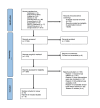A Systematic Review of Comparative Effectiveness of Interventions for Low Anterior Resection Syndrome: Impacts on Bowel Function and Quality of Life
- PMID: 39483606
- PMCID: PMC11527395
- DOI: 10.7759/cureus.72772
A Systematic Review of Comparative Effectiveness of Interventions for Low Anterior Resection Syndrome: Impacts on Bowel Function and Quality of Life
Abstract
Low anterior resection syndrome (LARS) is a common complication following sphincter-preserving surgical resection for rectal cancer, characterized by symptoms such as fecal incontinence, urgency, and altered bowel habits, which significantly affect patients' quality of life. This cluster of symptoms not only limits their day-to-day physical activity but also has a debilitating effect on their emotional and mental well-being, undermining their integration and overall psychological health. This systematic review aimed to evaluate the effectiveness of invasive and non-invasive interventions for LARS, including pelvic floor rehabilitation, transanal irrigation, and various surgical options such as sacral neuromodulation and stoma formation, either as part of primary surgery or as a definitive treatment option for refractory cases. We systematically searched relevant databases for studies published in the last decade, focusing on adult patients diagnosed with LARS post-low anterior resection (LAR), with outcomes assessed through bowel function and quality of life metrics. The review identified six studies that met our eligibility criteria; a pooled cohort of 794 patients was identified, with sample sizes ranging from 37 to 430 participants. Our analysis revealed that pelvic floor rehabilitation significantly improves bowel function and quality of life in patients with LARS; yet, the optimal management approach remains unclear due to variability in patient responses. These findings highlight the inherent complexity and heterogeneity of LARS management, underscoring the necessity for multifaceted and individualized treatment strategies. Although pelvic floor rehabilitation shows promise, especially among motivated patients, its long-term sustainability remains uncertain. Surgical options are typically reserved for severe cases and carry significant risks and psychological impacts. For patients identified as being at high risk for LARS, treatment options must be considered and discussed at an earlier phase of their care. Our review concludes with the need for a tailored, patient-centered approach to managing LARS, highlighting the importance of ongoing research to fill existing evidence gaps. There is a need for translational research across various treatment modalities, comparing their effects, cost-effectiveness, implementation strategies, and the consequent effects on patients' quality of life and mental health.
Keywords: bowel function; colorectal cancer surgery; lars; low anterior resection; low anterior resection syndrome; quality of life; rectal cancer surgery; sphincter sparing rectal surgery; systematic review.
Copyright © 2024, Ansar et al.
Conflict of interest statement
Conflicts of interest: In compliance with the ICMJE uniform disclosure form, all authors declare the following: Payment/services info: All authors have declared that no financial support was received from any organization for the submitted work. Financial relationships: All authors have declared that they have no financial relationships at present or within the previous three years with any organizations that might have an interest in the submitted work. Other relationships: All authors have declared that there are no other relationships or activities that could appear to have influenced the submitted work.
Figures
References
-
- Lotfollahzadeh S, Kashyap S, Tsoris A, et al. Treasure Island (FL); 2024. Rectal Cancer. - PubMed
-
- Colorectal cancer statistics, 2023. Siegel RL, Wagle NS, Cercek A, Smith RA, Jemal A. CA Cancer J Clin. 2023;73:233–254. - PubMed
-
- Chinese Protocol of Diagnosis and Treatment of Colorectal Cancer (2020 edition) Zhonghua Wai Ke Za Zhi. 2020;58:561–585. - PubMed
-
- Epidemiology and pathophysiology of low anterior resection syndrome. Kay Kay, D.I. D.I., Theiss Theiss, L.M. and Chu. https://doi.org/10.1016/j.scrs.2021.100844 Seminars in Colon and Rectal Surg. 2021;32,4:100844.
-
- Outcome of bowel function following anterior resection for rectal cancer-an analysis using the low anterior resection syndrome (LARS) score. Kupsch J, Jackisch T, Matzel KE, et al. Int J Colorectal Dis. 2018;33:787–798. - PubMed
Publication types
LinkOut - more resources
Full Text Sources
Miscellaneous

